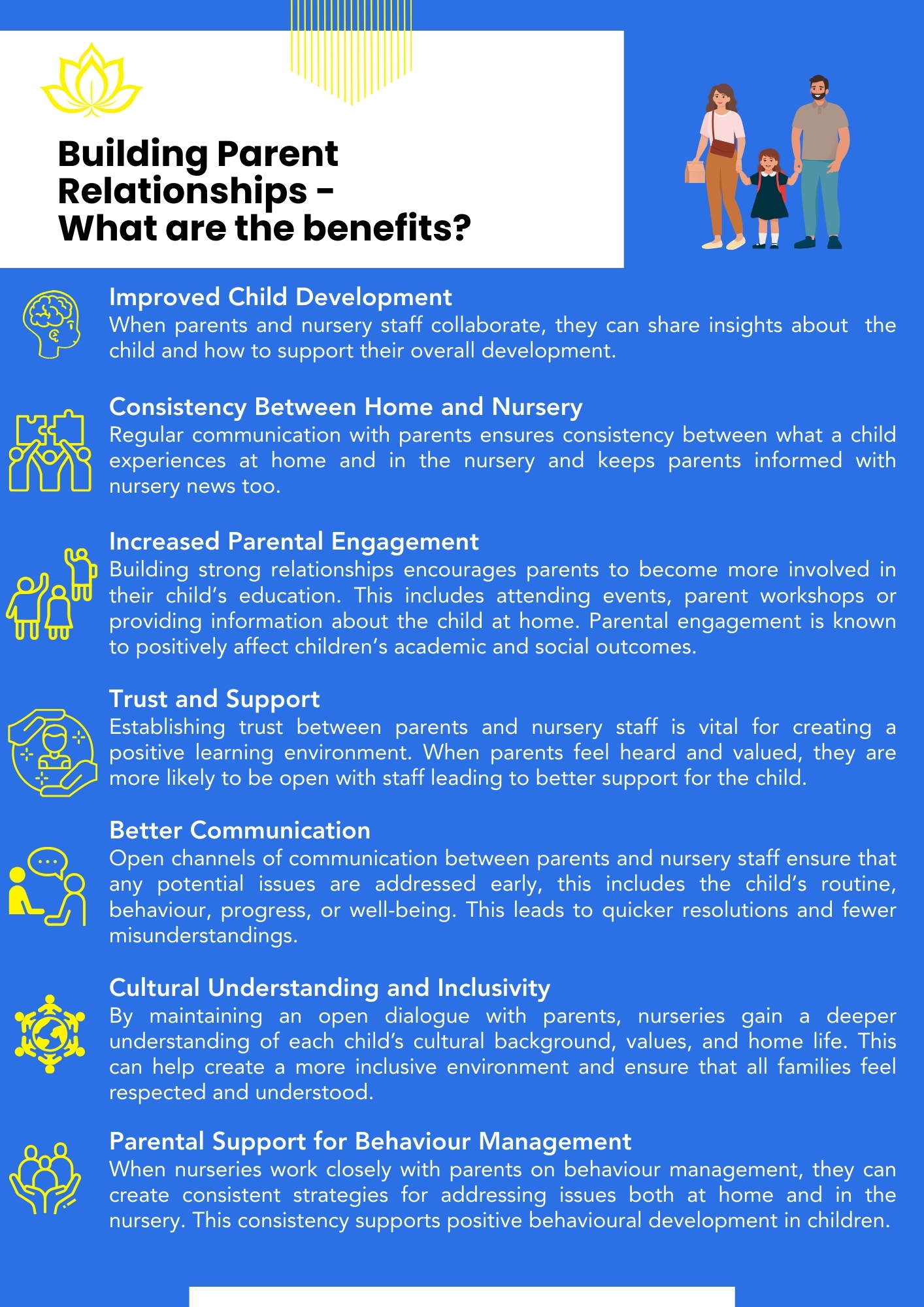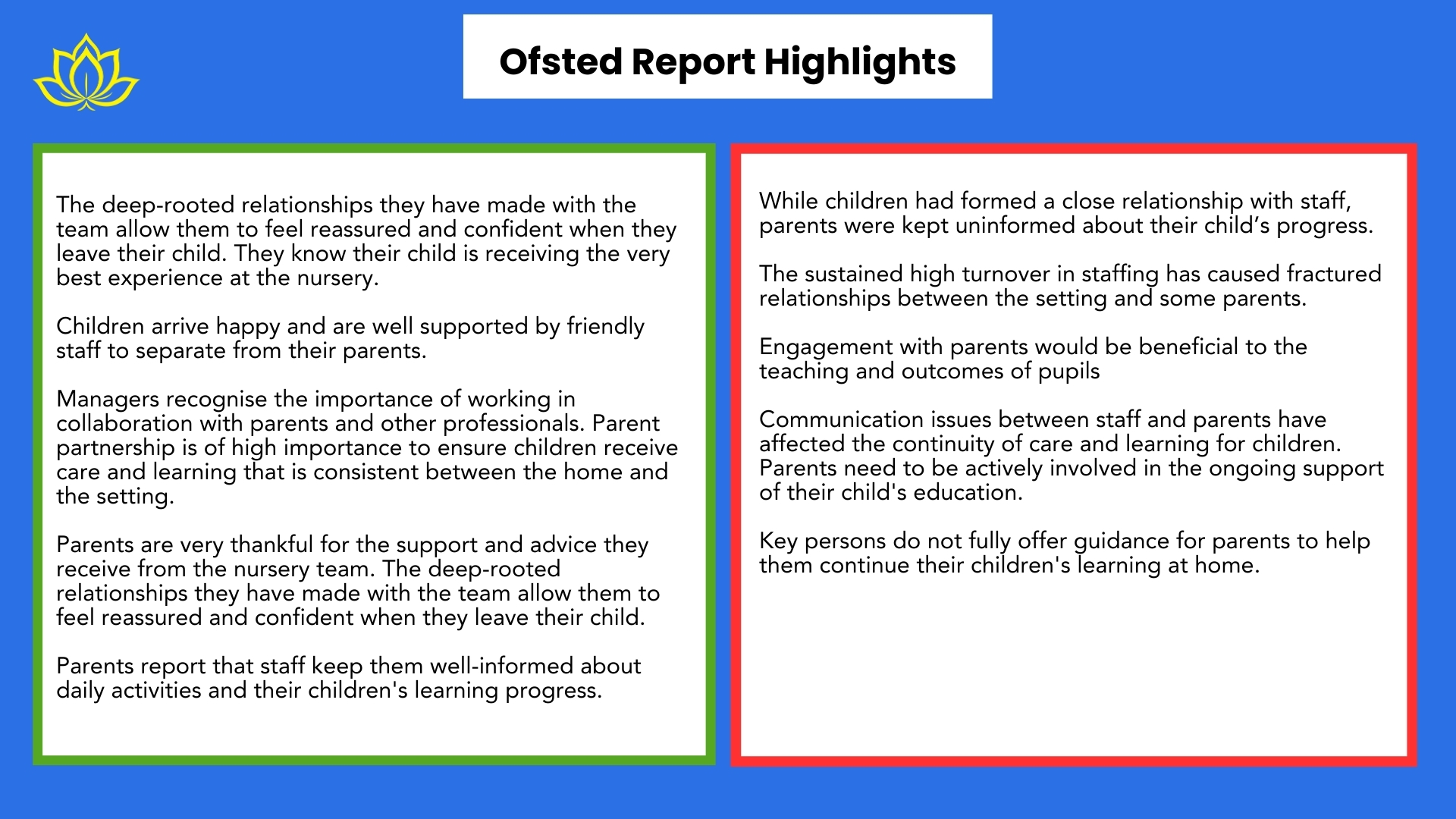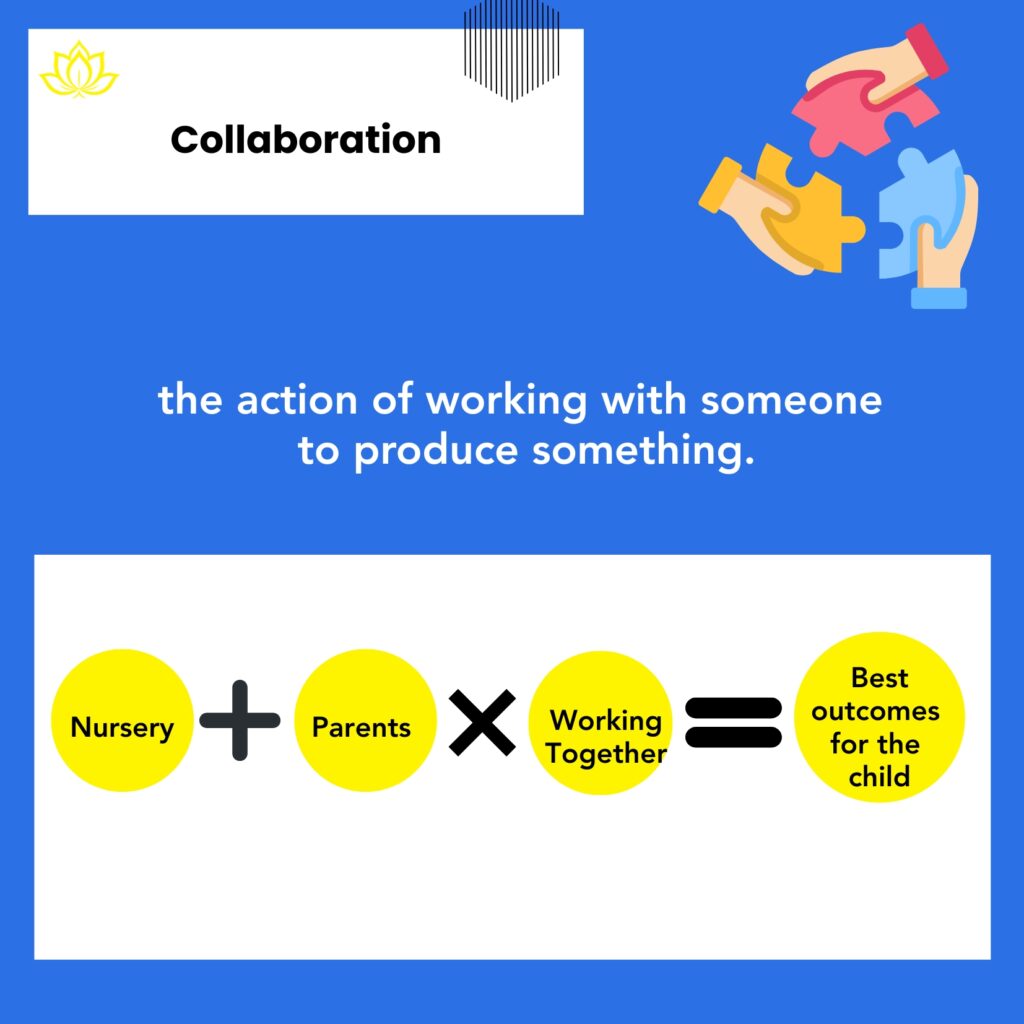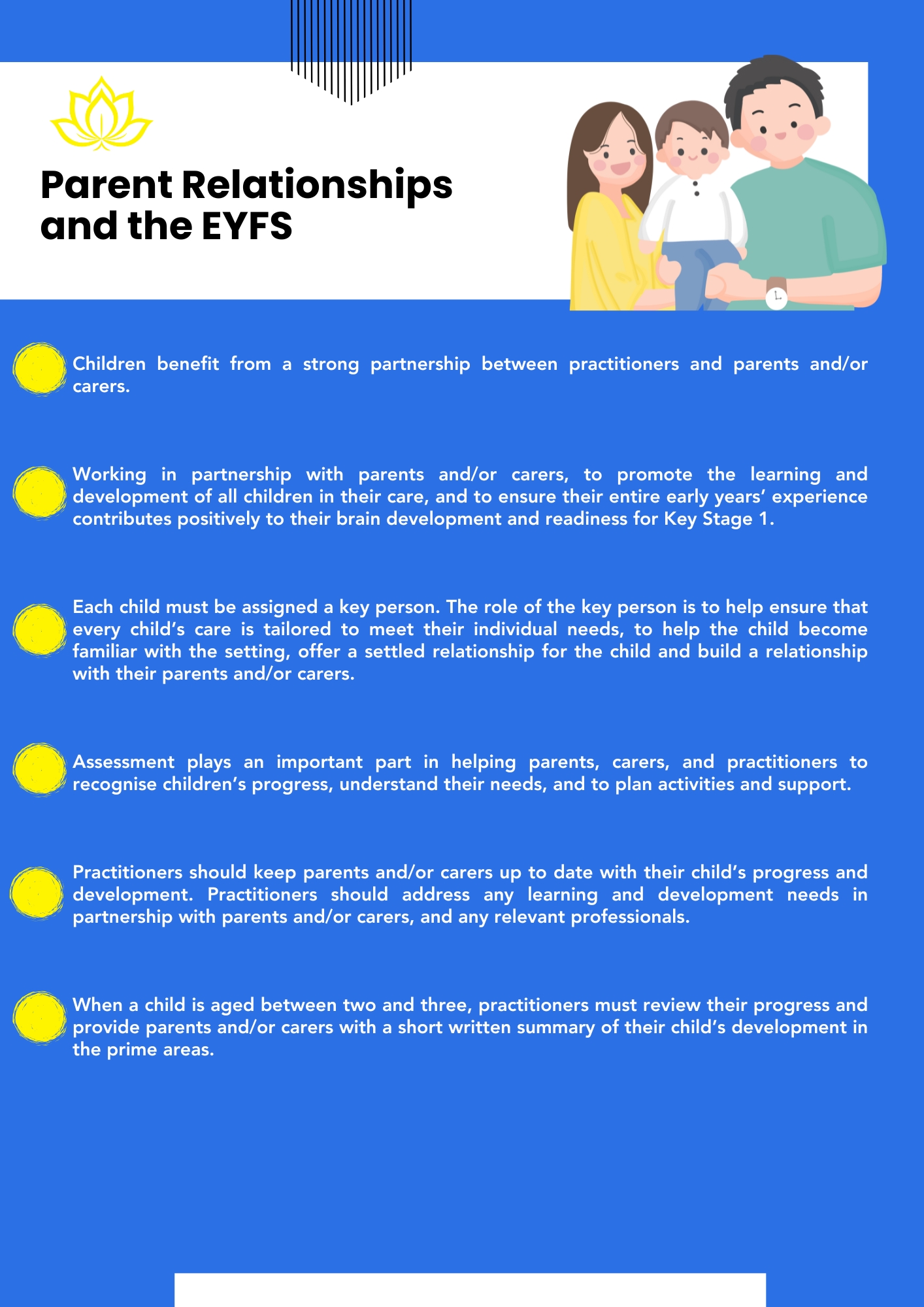A setting who gets this right will…
- Have stronger relationships with parents.
- Be able to offer better care and education to the children as a result.
- Attract more families to your nursery through word of mouth.
- Have smoother handovers with parents so a better experience for your team and them daily.
- Have better communication channels promoting an open and positive community.
“At the end of the day, the most overwhelming key to a child’s success is in the postive involvement of parents” Jane D. Hull

Principles for building parent relationships
- Establish Open and Clear Communication
- Create a Warm and Welcoming Environment
- Active Listening and Empathy
- Involve Parents in Their Child’s Learning
- Work as a Partnership
- Confidentiality and Professionalism
- Celebrate Achievements Together
- Offer Support and Guidance
Building strong and positive relationships with parents is important for several key reasons including creating a supportive, collaborative environment for young children in the setting.. These factors ultimately contribute to the child’s development, well being and overall experience at nursery.
What do Ofsted Reports capture?

What does Open and Clear Communication mean in practice?
- Initial Introduction: You don’t get a second chance at a first impression
- Make parents feel welcome from the very start – initial enquiry, tour of nursery by introducing them to staff, providing information about the nursery’s policies and values, and explaining the daily routine.
- Regular Updates: Make sure they know how amazing your nursery is and how wonderful their child is doing
- Share regular updates on the child’s development, milestones, and any concerns. This can be done via:
- Informal chats at drop-off/pick-up
- phone calls
- Nursery apps – Famly, tapestry
- Emails.
- Newsletters
- Nursery social media
- Share regular updates on the child’s development, milestones, and any concerns. This can be done via:
- Timely: Communication done at the wrong time is the same thing as bad communication, sometimes worse
- There is so much information that we need to share with parents in a timely manner so choosing the correct format for communication is important.
- Explain to parents if you have communication guidelines for example staff will not reply to emails/app notifications after a certain time or that staff may not respond to messages immediately during the working day as their main priority is being with the children.
- Open-Door Policy:
- Ensure parents know that they can speak with staff members or the nursery manager whenever needed, but to raise concerns to the appropriate person.
- Make time for scheduled meetings to discuss the child’s progress, even if over the phone.
- Parent Surveys and Feedback: You don’t know what you don’t know
- Regularly ask for parent feedback through surveys or informal conversations, helping parents feel involved in the nursery community.
- People often feel more comfortable giving feedback, and give more detail, when doing so online or with time to think.
- Key person: They are literally the KEY person
- Ensure that the parents are informed who their child’s key person is and if there are any changes coming up.
- This can mean everything to some parents and this individual often becomes a part of the family, with babysitting and offering advice through key milestones.
- This relationships needs focus and nurturing, constantly. (Luckily we have a specific course on that here). [NEED TO ADD LINK]
Task One – Information Sharing Options
Reflective Activity – Match the type of information to the best type of method you think should be used.
Match the type of information to the best type of method you think should be used:
App
Telephone
Face to Face (on the door)
Telephone
Face to Face (in private)
What they ate for lunch
Bump to head
2 year check feedback
Concerns about biting incidents
General update about child’s play
These sorts of things often aren’t black and white, so do talk them through with a colleague to see what they think too.
[Should there be a reflective activity here to allow people to reflect on the different levels on the framework before continuing? Like other courses] It would lead well to the below…
Where are you at as an individual and as a team?
Consider which statement below best reflects you currently and if this differs across your team? How can you learn from others that do this better than you and how can you support those you do it better than?
| Parents seek you out as a key person and positive feedback is received frequently. | Strong relationships are formed with parents and their child even though you may not be key worker. | Some relationships are formed with some parents and their child. | Relationships are not formed with parents and their child. |
Now you have started reflecting more try the below with your team and even design one for yourself.
Collaboration is key
You probably already know the importance of collaboration, not only with your team and with other agencies, but of course with parents too. Check out the video below to learn about some essential building blocks for this, including:
- A warm and welcoming environment
- Active listening and empathy
- The importance of involvement
- Working as partnership
- Confidentiality and professionalism
- Celebrating achievements together
- Offering support and guidance

First impressions count, I am sure we all know that. In the Early Years world there are several ‘first impression’ moments… the show round, parent 1, parent 2, grandparents, transitioning to a new room etc. One thing that doesn’t change is the importance of being warm and welcoming.
Listening is a skill that can help with all walks of life, and in Early Years when working with parents it is particularly important.
Parents need to feel involved and it is important to enhance the team you form with them in supporting their child in your care.
Building the Community
Involving the parents in events not just parent meetings or Christmas plays. Think about events like stay and play sessions, getting parents to talk to the children about their jobs, getting parents/families to help with developing garden spaces this may be their area of expertise or have work grants to help in the community. Or events like a nursery park run with the staff and children, that encourage togetherness and being active. Children learn more from what they see adults in their life do more than what they say.
Don’t just take out word for it, this is what parents at Always Growing had to say about us. Feel free to download and print the blank one to fill it up with positive comments about your setting.



We have a great time at out events…
And parents support us where they can too with donations from their companies to enhance our provision. Some garden tools was the latest gesture, and we even had a little photoshoot too.
What does the EYFS say about parent relationships?

Conversations with parents– Some things to consider
Where – Is this a conversation topic that you can have at the nursery door with the child around or is this best to have in a meeting room/quiet area of the nursery
When – Consider the time of day for these meetings and allow enough time for the meeting to happen without it being rushed because you are required back in the room for staffing levels or the office is booked for another meeting in 10 minutes
Who – If discussing sensitive information/concerns about a child with a parent, will require the skills of experienced staff who have some experience of working with parents and addressing concerns about their children. Remember, less experienced staff need a chance to learn new skills and build those reassuring relationships with parents. This could be facilitated by asking parents if, at a future meeting, they would mind another member of staff sitting in on the meeting. It is vital that the person chosen for the meetings is someone with good social and communication skills, including good listening skills and ability to show empathy and understanding and a relationship with the parents
How – Some basic guidelines can be followed. Be as open and honest as possible. Start and end the meeting on a positive note – for example, start off by first talking about some of the progress the child has made and mentioning one or two good points about the child. Then you may wish to ask the parents how they feel their child is getting on at nursery.
Not all conversations are easy, that doesn’t mean you should avoid them though. Check out this free course from Edventurous Leadership on ‘How to have difficult conversations’.
In conclusion
Building reassuring relationships with parents contributes to a positive environment for the child but also forms a collaborative partnership that leads to a more enriching, well rounded experience for the children. As well as developing a community and greater satisfaction and trust for the parents.. To do this requires an ongoing amount of effort patience, team work, listening and clear communication.
GIST – Good ideas for starting things…
- Reflect on your last interaction with a parent. Was it rushed or calm? Was it clear or vague? How did you feel after it? How do you think they felt after it?
- Create a short questionnaire to go out to your parents, a simple what is going well and what can we do better would suffice.
- [Any more?]
Want to learn more?
- See this guide on sharing concerns about a child with parents and carers from the Anna Freud Centre
- Famly share some helpful insights into how to have difficult conversations with parents here.
- Here are some conflict resolution strategies from Blossom for when parents might get angry.
- Education Support have a helpline and have an interesting article on being ‘Better Together’ here.
